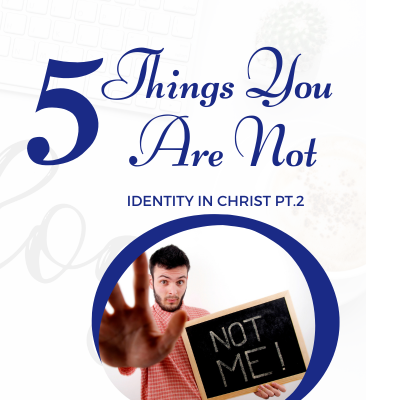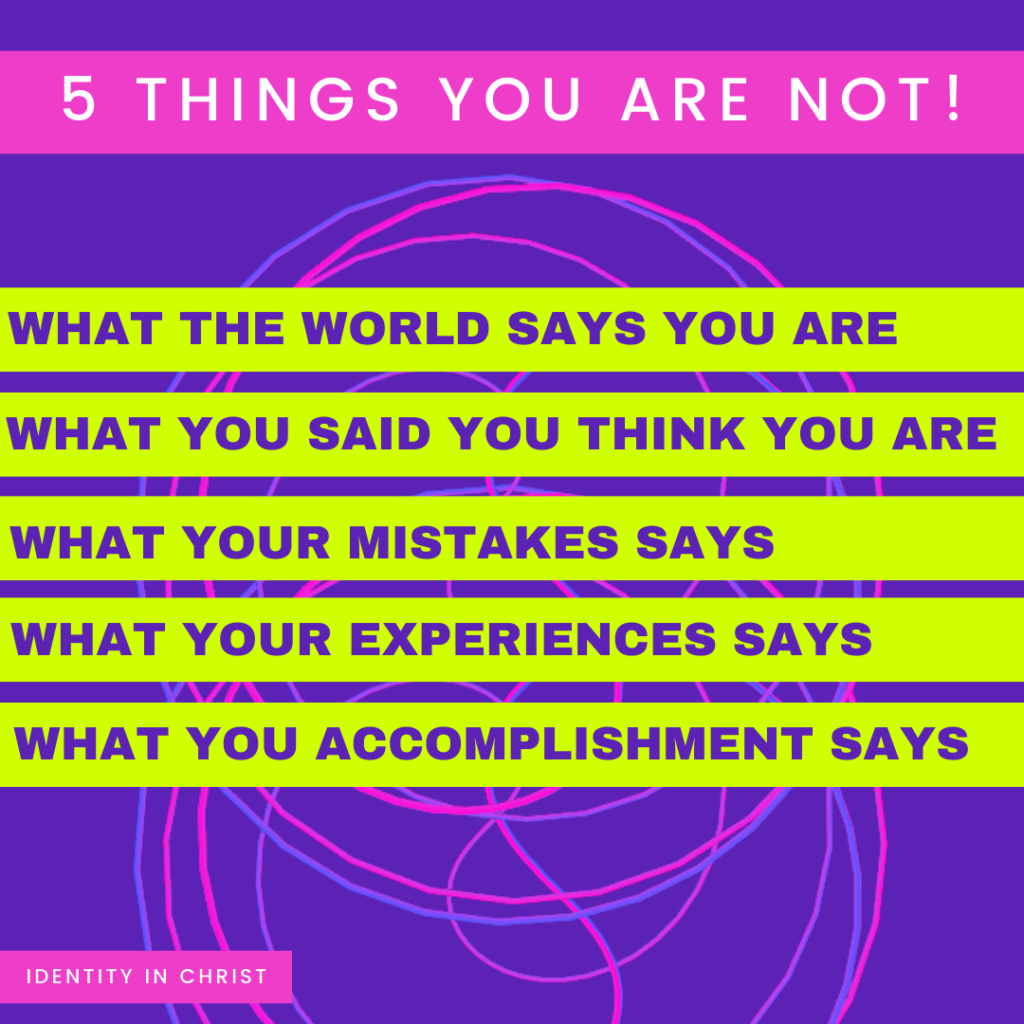5 Things You Are NOT…

In our previous session, we talked about the principle which says that
“Who you believe you are deep down inside, will eventually drive what you do. And whatever identity you embrace most, will essentially shape the course of your life”
Conrad L. Jones
In this session, let’s continue our short journey which I believe will help you connect with a deeper sense of who you are in Christ Jesus, by discussing the 5 things that you are not…
In John 10:10, Jesus makes a contrast between Himself as the giver of life and abundance and the thief whose only goal is to take away life.
He said,
“The thief comes only to steal and to kill and to destroy. I have come so that they may have life and have it in abundance.”
Jesus Christ
As you connect with your true identity in Christ, you must always be mindful of the thief that wants to rob you of all God says that you can be, do, and have. More importantly, you’ve got to be careful of who you listen to and take advice from.
Aesop in his fabled stories tells a narrative about a Crow and Fox

“A crow is sitting in a tree with a piece of cheese in its beak. A passing fox would like to eat the cheese and tries to persuade – and then trick – the crow to bring the cheese down or drop it. The crow does not fall for this, so the fox tries flattery instead.
The fox tells the crow how lovely his feathers are, and how fine-looking his head. Then, the fox says how much he would like to hear the crow sing. Tricked by the flattery, the crow opens his beak to sing, dropping the cheese to the ground, where the fox gobbles it up.
This story reminds me of a similar one in the Garden of Eden in Genesis 3.
The serpent/devil, loathing the fact that mankind is created in the image and likeness of God and shares such a beautiful relationship with God that He comes and meets with man and walks and talks with him in the cool of the evening every day, works his deception to disrupt that close union and fellowship.
He approaches the woman and said, “Did God really say, ‘You can’t eat from any tree in the garden’?” The woman said to the serpent, “We may eat the fruit from all the trees in the garden. But about the fruit of the tree in the middle of the garden, God said, ‘You must not eat it or touch it, or you will die.’”
“No! You will not die,” the serpent said to the woman. “In fact, God knows that when you eat it your eyes will be opened and you will be like God, knowing good and evil.” And as they say, the rest is history!
So, you must be careful of who you are listening to.
I want to walk you through 7 very powerful things that God has said about your identity and who you are, but before we jump deeper into that, let’s expose some untruths which you should never accept about you. Let’s talk about who you are not…

Here are 5 things that you are not…
- You are not who the world says you are – the world, which refers to the evil system which is against God, has an opinion of you and it is never good. Jesus said in John 15:18-19 that, “If the world hates you, understand that it hated Me before it hated you. If you were of the world, the world would love you as its own. However, because you are not of the world, but I have chosen you out of it, the world hates you.” So you are not who the world says you are; you can never connect with your true identity based on the world’s opinion because everything the world says about you comes from a place of hatred, so it will always be lies.
- You are not who you have often told yourself you are – In Judges Chapter 6, the angel of the Lord walks up to Gideon who is hiding in a winepress threshing wheat and calls out to him, “Gideon, Mighty man of valour”.
But instead of being excited about this, Gideon struggles with this new identity because all his life he has told himself that he is worthless and nothing good could ever come out of his life.
His background had taught him that his family was in the weakest tribe in the nation of Israel, his father’s house was the poorest family in that tribe, and he was the least significant person within his father’s house.
And because this was the identity he claimed for himself, he lived defeated until God changed his identity. Wherever you have come from in your life, you cannot trust who you have told yourself you are, you can only trust who God says you are. - You are not defined by your mistakes – As Jesus was facing his final hours before he was crucified in Matthew 25, he spent his last meal with his disciples. He tells them, “Tonight all of you will run away because of Me, for it is written: I will strike the shepherd, and the sheep of the flock will be scattered.”
“But after I have been resurrected, I will go ahead of you to Galilee.” Peter responds to Jesus by saying, “Even if everyone runs away because of You, I will never run away!” Jesus looks at him, smiles and says “I assure you, tonight before the rooster crows, you will deny Me three times!” Peter says, “Even if I have to die with You, I will never deny You!”
As the story plays out, Peter denies Jesus three times, and when he hears the cock crows he remembers the words of Jesus and runs outside sorrowfully and weeps bitterly.
On the resurrection morning when Jesus rose from the dead, Mary Magdalene, Mary the mother of James, and Salome are carrying spices to anoint Jesus’ body when they are confronted with an empty tomb and an angel of the Lord who tells them that Jesus has risen as he said, and to go tell the disciples and Peter, to meet Jesus in Galilee, just like he had asked them to do prior to the crucifixion.
Jesus did not reject and exclude Peter from being among the disciples because of his mistakes, but rather, Jesus embraced him. In the same way, you are not defined by your mistakes, but rather, you are defined by who God says you are in Christ. - You are not defined by your experiences – In John chapter 4, Jesus sits on a well in Samaria alone as all the disciples have gone away to find food. A woman comes to draw water, and he asks her for a drink. The woman is surprised at his request because she knows from experience that Jews do not associate with Samaritans, and she makes Jesus understand that she is fully aware of this.
Jesus responds by saying “If you knew the gift of God, and who is saying to you, ‘Give Me a drink,’ you would ask Him, and He would give you living water”. The woman is a little confused now because she still believes that Jesus is speaking about the natural water, but he has switched to talking about spiritual things.
To enlighten her a little more, Jesus says to “Everyone who drinks from this water will get thirsty again. But whoever drinks from the water that I will give him will never get thirsty again—ever! In fact, the water I will give him will become a well of water springing up within him for eternal life.”
The woman, even though she does not really understand what Jesus is offering, but somehow knows it is something special says, “Sir, give me this water so I won’t get thirsty and come here to draw water.”
This is where the conversation gets interesting because Jesus switches his focus again and says to the woman, “Go call your husband and come back here.” The woman responds by saying, “I don’t have a husband”, to which Jesus responds, “You have correctly said, ‘I don’t have a husband,’ for you’ve had five husbands, and the man you now have is not your husband.
It is at this point that the woman finally recognizes that she is speaking to a prophet and somehow, even though he seemed to know about her past and her experiences, he has not disqualified her from receiving what God wanted to give her.
Even though he knew she moved from man to man, and at present was living with someone who wasn’t her husband, Jesus did not define her by her experiences, rather, Jesus opened the treasure of God’s love to her; and this changed her life. You are not defined by your experiences, your identity is based on who God says you are in Christ. - You are not defined by your accomplishments – The story of the rich young ruler is recorded in Mark’s gospel chapter 10. As Jesus was concluding a conversation with the Pharisees who were trying to trap him with questions about divorce and what Moses had said, a rich young ruler enters the conversation just before he leaves off on a possible business trip.
When you examine his conversation with Jesus, you get the impression that his motives for seeking eternal life are really based around adding another accomplishment to his growing list of exploits. He asks Jesus, “What must I do to inherit eternal life?”
Jesus responds and says, “You are acquainted with the commandments – do not murder; do not commit adultery; do not steal; do not bear false witness; do not defraud; honour your father and mother.”
The young ruler thinks to himself, ‘is that all I need to do to possess eternal life – we’ll I’ve got this one marked down” so he excitedly and proudly responds, “I know those commandments well – as a matter of fact, I have observed and lived by them since I was much younger”.
Jesus however, knowing that his focus is about being self-righteous, just like the Pharisees have been about working to do things that they somehow believed pleased God, rather than embracing and becoming who God wanted them to be, suddenly pointed him in an unexpected direction.
Jesus says, “there is however one thing you lack. Go, sell all you have and give to the poor, and you will have treasure in heaven. Then come, follow Me.”
At this point, the young ruler slowly rises to his feet and walks away without saying another word because his heart is heavy. How could Jesus demand such a high price such as getting rid of everything he has worked so hard to accomplish, just to follow him.
It was a difficult thing to do because his identity was built around what he had accomplished. But what had failed to realize was that Jesus wasn’t impressed by his accomplishments, but was offering him the chance to become someone accomplished – someone who could obey and follow God.
You are not defined by what you have or have not accomplished – your identity is not derived from what you have done, rather, it comes from who God says you are.
So if you are not who the world says you are; if you are not who you have often told yourself you are; if you are not defined by your mistakes; if you are not defined by your experiences; if you are not defined by your accomplishments, then what defines and shapes your identity and who you are?


